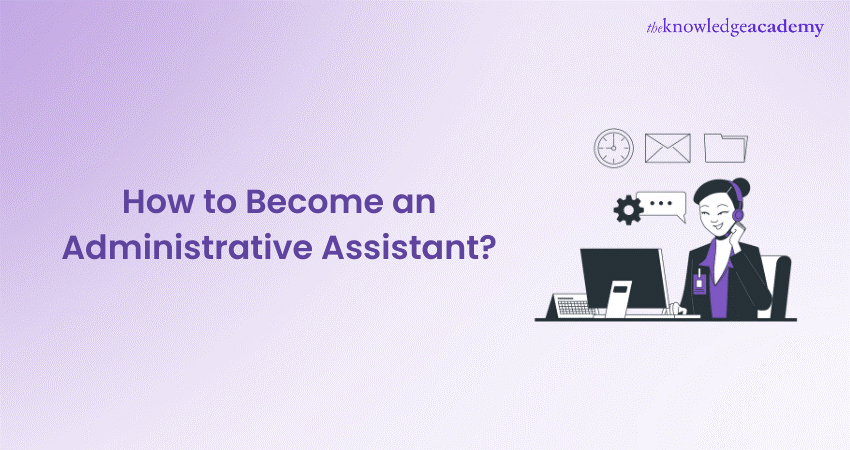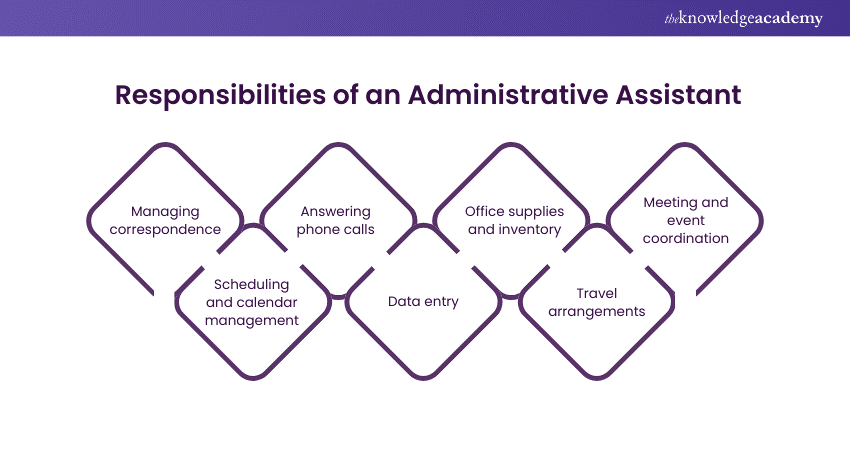We may not have the course you’re looking for. If you enquire or give us a call on 01344203999 and speak to our training experts, we may still be able to help with your training requirements.
Training Outcomes Within Your Budget!
We ensure quality, budget-alignment, and timely delivery by our expert instructors.

If you're interested in How to Become an Administrative Assistant, it's essential to understand the skills and responsibilities that come with this important position. This crucial role ensures that daily operations run smoothly and efficiently. According to the U.S. Bureau of Labor Statistics, there were over 3.6 million Administrative Assistant positions in 2022. This statistic highlights the demand for this profession.
Their organisational skills and attention to detail are important for the success of the entire team. If you’re looking for a stable and essential career, becoming an Administrative Assistant is a smart choice. Read this blog to learn How to Become an Administrative Assistant.
Table of Contents
1) Requirements for an Administrative Assistant
2) Responsibilities of an Administrative Assistant
3) Career Advancement as an Administrative Assistant
4) Conclusion
Requirements for an Administrative Assistant
To become an Administrative Assistant, you need to have a certain level of education, skills, and experience. Here are some of the common requirements for this role:
Education
1) High School Diploma or Equivalent: The bare educational qualification is a high school diploma or GED. This offers a foundation in basic skills, such as reading, writing and arithmetic.
2) Postsecondary Training: While not always mandatory some employers prefer candidates with postsecondary training. This can include certificate programs. Or associate degrees in office administration. Or related fields.
Skills
1) Organisational Skills: Administrative Assistants should be able to manage multiple tasks efficiently. They also need to prioritise their workload.
2) Communication Skills: Verbal and written skills are vital. This includes the ability to write clear emails. Reports need to be clear. Interacting professionally with colleagues. Clients are essential.
3) Technical Skills: Proficiency in office software such as Microsoft Office Suite (Word Excel, PowerPoint) is essential. Familiarity with office equipment and basic troubleshooting beneficial.
4) Attention to Detail: Administrative Assistants need to be careful. They are often responsible for ensuring documents. Records are accurate and error-free.
5) Time Management: The capability to manage time effectively and meet deadlines is critical. This is especially true when juggling multiple tasks.
Experience
1) Entry-Level Positions: Many Administrative Assistants begin careers in entry-level roles. They gain practical experience. This can include internships or part-time positions. These roles are often undertaken during or after completing education. They are also common stepping stones.
2) On-the-Job Training: On-the-job training is common. New hires learn specific procedures and software used by the organisation.
3) Certifications: Obtaining certifications such as the Certified Administrative Professional (CAP) credential can enhance job prospects. These certifications show a commitment to the profession.
Personal Attributes
1) Professionalism: Administrative Assistants are often the face of an organisation. They need to maintain a professional demeanor. This is essential at all times.
2) Adaptability: The capability to adapt to changing environments and tasks is important. Especially true in a dynamic role.
3) Problem-Solving Skills: Being able to troubleshoot issues is valuable. Finding solutions independently is also crucial.
4) Discretion: Handling sensitive information with confidentiality. Discretion is crucial.
Responsibilities of an Administrative Assistant
Administrative Assistants play a pivotal role in the smooth operation of an organisation. They are responsible for various duties that contribute to the overall efficiency and effectiveness of the office. Here are some common responsibilities of an Administrative Assistant:

1) Managing Correspondence: Administrative Assistants handle emails, letters, and communications, ensuring professionalism and accuracy in written correspondence.
2) Scheduling and Calendar Management: They maintain schedules, appointments, and meetings, ensuring efficient time management for executives or teams.
3) Answering Phone Calls: Administrative Assistants serve as the first point of contact, answering calls, screening inquiries, and providing information or redirection.
4) Data Entry and record-Keeping: They maintain organised records, databases, and filing systems, ensuring information is easily accessible.
5) Office Supplies and Inventory: Administrative Assistants manage office supplies and inventory, ensuring the smooth functioning of the office.
6) Travel Arrangements: They assist in booking travel for business purposes handling flights, accommodations, and itineraries.
7) Meeting and Event Coordination: Administrative Assistants plan, organise, and coordinate meetings, conferences, and events, ensuring they run smoothly.
These core responsibilities highlight the critical role Administrative Assistants play in supporting the daily operations of an organisation.
Elevate your Administrative prowess with our PA and Secretarial Courses – Sign up now!
Career Advancement as an Administrative Assistant
While the role of an Administrative Assistant is often seen as an entry-level position, there are many opportunities for career growth. Here are some steps. You can advance in this field:
1) Expand Your Skill Set
a) Technology Proficiency: Gain expertise in office software (e.g. Microsoft Office Suite, Google Workspace). Learn to use specialised software relevant to your industry.
b) Communication Skills: Enhance both your written and verbal communication abilities. This is crucial to interacting effectively with colleagues and clients.
c) Organisational Skills: Develop advanced organisational strategies. Manage your workload and prioritise tasks efficiently.
2) Pursue Additional Education and Certifications
a) Certifications: Consider obtaining certifications like Certified Administrative Professional (CAP) or Microsoft Office Specialist (MOS). These demonstrate your proficiency and commitment to the role.
b) Further Education: Enroll in courses or pursue degrees in business administration office management, or related fields. Increase your knowledge and qualifications.
3) Seek Mentorship and Networking Opportunities
a) Mentorship: Find a mentor within your organisation or industry. They can provide guidance, support, and insights into career advancement.
b) Networking: Attend industry conferences. Join professional associations. Take part in networking events to connect with other professionals and learn about new opportunities.
4) Take on Leadership Roles
a) Supervisory Positions: Aim for roles that involve overseeing other administrative staff. Positions like office manager or executive assistant are ideal.
b) Project Management: Volunteer to lead special projects. Initiatives within your organisation also offer opportunities. This will demonstrate your leadership and organisational skills.
5) Explore Specialisations
a) Executive Assistant: Consider specialising as an executive assistant. Work closely with top executives. Manage more complex tasks.
b) Industry-Specific Roles: Look for administrative positions in specialised fields such as legal medicine or educational administration. Specific knowledge and skills are highly valued.
Supercharge your Office Skills with our Office Skills Training – Sign up now!
Conclusion
We hope you read and understood everything about How to Become an Administrative Assistant. This job role involves meeting educational requirements, gaining practical experience, and developing essential skills. With passion and dedication, you can succeed in this career and contribute to the success of your organisation.
Redefine your career with our Administrative Assistant Training – Sign up today!
Frequently Asked Questions

The duration of becoming an Administrative Assistant can vary. Typically, it takes 2 to 4 years, including the time to complete your High School education or obtain a GED certificate and potentially pursue an associate degree in Administrative Support. Gaining experience in entry-level administrative roles and further education may also impact the timeline.

While formal education can be advantageous, it's not always a strict requirement to become an Administrative Assistant. Many entry-level positions value relevant experience and practical skills. However, having an associate degree or related certifications can enhance your qualifications and job prospects in this competitive field.

The Knowledge Academy takes global learning to new heights, offering over 30,000 online courses across 490+ locations in 220 countries. This expansive reach ensures accessibility and convenience for learners worldwide.
Alongside our diverse Online Course Catalogue, encompassing 17 major categories, we go the extra mile by providing a plethora of free educational Online Resources like News updates, blogs, videos, webinars, and interview questions. By tailoring learning experiences further, professionals can maximise value with customisable Course Bundles of TKA.

The Knowledge Academy’s Knowledge Pass, a prepaid voucher, adds another layer of flexibility, allowing course bookings over a 12-month period. Join us on a journey where education knows no bounds.

The Knowledge Academy offers various PA and Secretarial Courses, including Administrative Assistant, Secretarial Masterclass, and many more. These courses cater to different skill levels, providing comprehensive insights into Role of Secretary.
Our Business Skills Blogs cover a range of topics related to Administrative Assistant, offering valuable resources, best practices, and industry insights. Whether you are a beginner or looking to advance your Business Skills, The Knowledge Academy's diverse courses and informative blogs have you covered.
Upcoming Business Skills Resources Batches & Dates
Date
 Company Secretary Training Course
Company Secretary Training Course
Fri 13th Dec 2024
Fri 14th Feb 2025
Fri 11th Apr 2025
Fri 13th Jun 2025
Fri 15th Aug 2025
Fri 10th Oct 2025
Fri 12th Dec 2025







 Top Rated Course
Top Rated Course



 If you wish to make any changes to your course, please
If you wish to make any changes to your course, please


